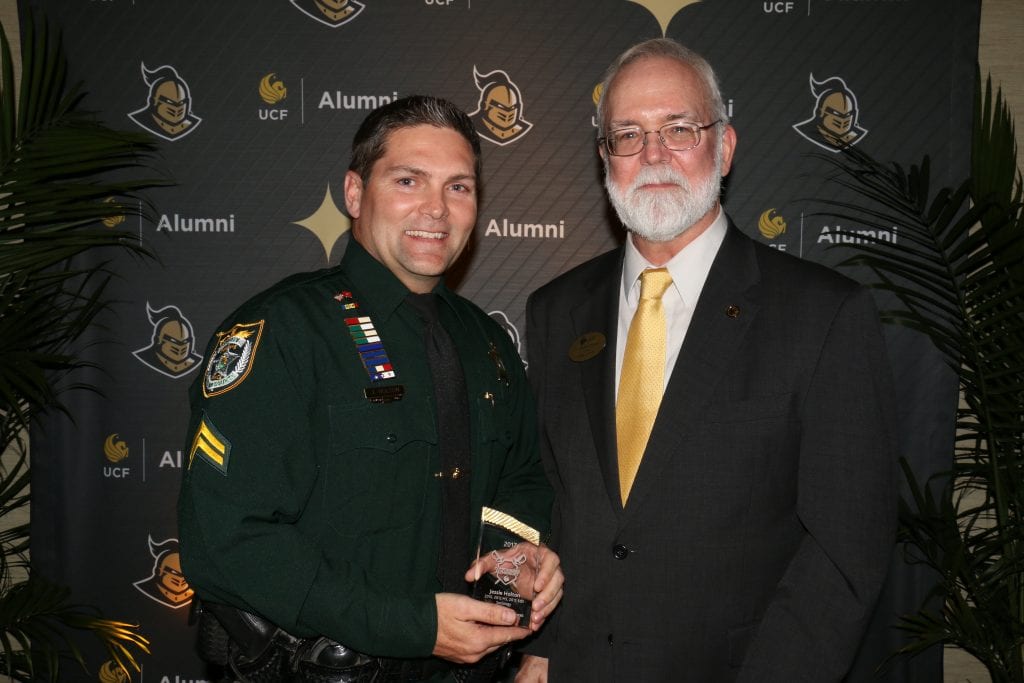Making Puppies Popular for Abuse Victims

November’s Outstanding AlumKnight Jessie Holton, Ed.D., has spent his life giving back to the community. A United States Marine Corps veteran, Holton now works in Brevard County’s Special Victims Unit as a major crimes investigator. He pairs this with continued research at UCF, working to understand the needs of his community and creating programs to fulfill them.
As a UCF alumnus, Holton pursued his education solely at UCF. His bachelor’s and master’s degrees in criminal justice led eventually to his doctorate in organizational sociology. Working full-time in the police force while completing his education, Holton knew the impact his continuing education would have on his abilities to serve his community as a police officer.
During his education, he enrolled in the course Child Abuse in Society. While completing a class assignment to create a mock grant proposal to battle child abuse, Holton stumbled upon a law that allowed child-abuse victims to use therapy dogs during interrogations and in court. Yet, no agencies had applied that law. Knowing how comforting his own therapy dog Primus was with him after suffering from post-traumatic stress disorder (PTSD) after two tours in Iraq and one in Afghanistan, Holton wrote up a grant proposal for a therapy dog program to help child-abuse victims and submitted it to his class. The idea was so popular, his class decided to create a real grant proposal.
Since he was working in the sheriff’s office, Holton was able to share his idea with Sheriff Wayne Ivey, who helped implement the therapy dog program. It was the first of its kind. Called The Qualter Project, Holton’s personal pup helped children remain calm during the investigation and trial process, and open up to police.
Since its creation, Holton’s program has been adopted nationally by other law-enforcement agencies.
“About once a month I get a call from a detective who expresses how much their therapy dog team assisted a young victim,” Holton said. “The enthusiasm and passion in their testimony is a memory that will never fade. This is an experience that lets me know I’ve made my mark on this earth.”
K-9 therapy teams helping with crimes against children are just the beginning of Holton’s work to serve the community. He has also designed and implemented policies for teams to deal with employee stress, worked to stop human trafficking in Brevard County, examined ways to increase communication between at-risk children and their parents and helped incorporate a program for inmates to train shelter dogs to ultimately become comfort and therapy dogs.
“My favorite thing about the job is having someone tell you that you made a significant impact on their quality of life,” Holton said. “There is no award or financial gain that tops that.”
Now, Holton has a research partnership between the sheriff’s office and UCF. He has over a dozen interns working on projects, researching and presenting ways to innovate law enforcement practices all over the country. He hopes to bridge a connection between practitioners and academics in law enforcement.
“So many victims of crime have received justice and better treatment because of the programs my agency and UCF have created through the research partnership I formed throughout my student experience,” he said.
Holton’s experience with UCF and his time in the Marine Corps has taught him the value of making the decision to take a risk.
“Live outside your comfort zone,” Holton said. “Don’t let your own anxiety or the words of others hold you back. Don’t be scared. Charge on!”
